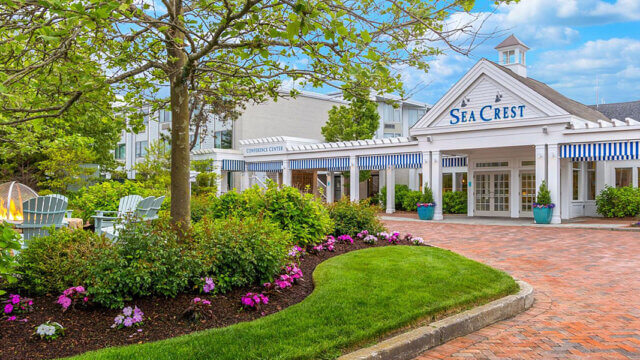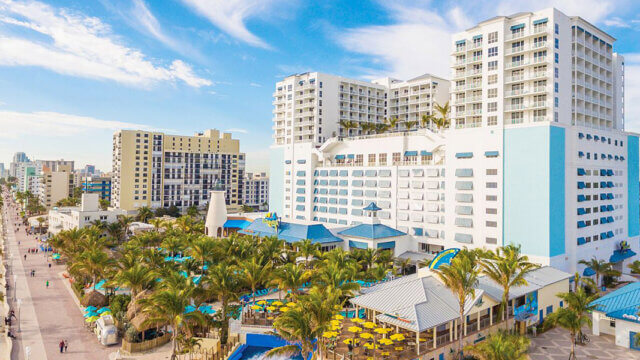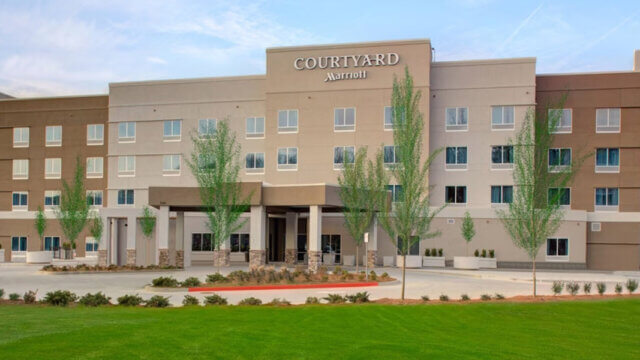BETHESDA, MD—During the second quarter, Pebblebrook Hotel Trust concentrated on reducing cash burn and completing renovation projects at its properties.
Pebblebrook Hotel Trust now has 24 hotels open, a significant increase from the end of March, when just eight hotels were open. The company also expects to open another five hotels in August.
“As a result of these hotel reopenings and improving leisure travel demand, our monthly hotel cash burn for May and June averaged about $10.5 million, which is $6 million better at the midpoint than the $15 million to $18 million average monthly cash hotel burn that we estimated during the first quarter call, which represented our worst-case scenario and assumed all of our hotels were closed,” said Raymond D. Martz, EVP, CFO, treasurer and secretary.
“Our combined hotel and corporate level average monthly cash burn for May and June was $22.5 million, which includes all interest and dividend payments,” he added. “This is down $5 million at the midpoint from our $25 million to $30 million monthly average cash burn we estimated on our first quarter call. Based on the 24 hotels that are currently open, we estimate our hotel cash burn for July to be $9 million to $12 million and our combined total cash burn to be $19 million to $24 million. Our focus continues to be on reducing our cash burn and returning to profitability.”
Martz noted that for the second quarter, the company’s total revenues of $22.3 million were 94.5% below the prior year period, with total hotel level expenses of $63.1 million, which were reduced by 75.7% from the prior year second quarter. “Excluding fixed operating expenses, such as property taxes, insurance and ground rent, operating expenses were cut by 84.5%,” he said. “We can feel as good as we can about these relative operating results in what has been the most challenging quarter we’ve ever experienced.”
Martz said the portfolio generated $3.5 million of revenue in April with eight hotels open; $5.6 million in May with nine hotels open; and $13.2 million in June with 16 hotels open, with some opening just a few days before end of June.
“For the second quarter, same-property hotel EBITDA was negative $40.8 million compared with positive $146.9 million in the prior year period,” he said. “Same-property hotel EBITDA was a negative $17.4 million in April, which was a low point in the quarter, and improved to negative $12.7 million in May and negative $10.6 million in June. July’s hotel EBITDA should show an incremental improvement from June.”
The company’s eight resorts have been the bright spot in the portfolio due to their appeal to leisure demand in drive-to locations. “They generated a positive $1.3 million of hotel EBITDA in June following operating losses in April and May,” Martz said. “EBITDA for the resorts should be higher in July and August, assuming governmental restrictions don’t become more severe. Average daily rates at our resorts during June were up over last year by 18.5%.”
“Resorts are driving our numbers for our open hotels,” added Jon E. Bortz, president/CEO/chairman of the board. “Resort occupancy should be around 45% for July for the eight resorts open at an ADR of roughly $315, which is 15% or so higher than last year’s ADR in July. These are really good numbers, all things considered. By comparison, our urban hotels should end around 20% occupancy or a little better at an ADR of around $175, which is really not a bad average rate considering such a low occupancy level. What’s even more encouraging to us are the dramatically improved efficiencies of our property operations, with all new operating models at each property that were created to address these much lower demand and occupancy levels.”
During the second quarter, Pebblebrook invested $39.5 million of capital into its portfolio, largely related to renovation and redevelopment projects, including converting the Donovan Hotel into Hotel Zena Washington DC; converting Mason & Rook Hotel into the Viceroy Washington DC; and the transformation of Viceroy Santa Monica Hotel.
“We currently expect to invest an additional $35 million to $40 million over the balance of the year, primarily to complete this year’s major redevelopment projects,” Martz added. “With this year’s completed renovations, 40 of our 53 hotels have been redeveloped or renovated over the last five years, which highlights the excellent condition of our portfolio. This will provide us with a competitive advantage in this downturn compared with other hotels that either haven’t recently been renovated or have owners who don’t have the access to reinvest for reinvestment capital.”
The company also recently completed the sale of Union Station Hotel Nashville, Autograph Collection for $56 million, which equates to approximately $448,000 per room. “Year-to-date, we’ve completed $387 million of property sales, which significantly enhances our liquidity,” Martz noted.
Bortz noted that Pebblebrook is doing everything it can to accelerate the recovery process, “including hunting for additional contract business like airline crews, which we otherwise wouldn’t have previously taken due to lower rates. But for the next year or two, we believe they’ll be financially attractive in most situations.
“We’ve also pursued and just successfully executed two separate large contracts for two different hotels in Boston with two different colleges to house a significant number of students for the fall semester,” he added. “Combined, these two contracts represent over 70,000 room nights and should reduce our cash burn at these properties by over $1.5 million a month through the end of 2020 on a combined basis, which should allow both properties to achieve either breakeven or to turn EBITDA positive, at least for the last four months of the year. Both of these could potentially be extended into the winter semester. And we also continue to pursue other nontraditional businesses business for our hotels.”
Looking toward the future, Bortz noted, “While significant uncertainty continues to exist, what has become clearer is that we should not expect any dramatic improvement in travel or the hotel business until our society is either more willing to make the relatively minor personal sacrifices necessary to mitigate the contagion, or our global society is successful in developing either treatment options to substantially mitigate health outcomes, or healthcare solutions that our population is willing to participate in—meaning even if there is an effective vaccine developed, that the vast majority of people must be willing to be vaccinated and do so as often as needed. We are, however, very encouraged by the pace and number of potential vaccines being developed and tested and the early results that have been disclosed so far.”




